

Sergei Eisenstein. Life and career[edit] Early years[edit] Young Sergei with his parents Mikhail and Julia Eisenstein.
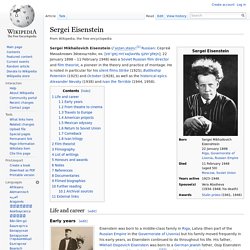
At the Petrograd Institute of Civil Engineering, Sergei studied architecture and engineering, the profession of his father.[11] In 1918 Sergei left school and joined the Red Army to serve the Bolshevik Revolution, although his father Mikhail supported the opposite side.[12] This brought his father to Germany after the defeat of the Tsarist government, and Sergei to Petrograd, Vologda, and Dvinsk.[13] In 1920, Sergei was transferred to a command position in Minsk, after success providing propaganda for the October Revolution. At this time, he was exposed to Kabuki theatre and studied Japanese, learning some 300 kanji characters, which he cited as an influence on his pictorial development.[14][15] These studies would lead him to travel to Japan. Battleship Potemkin. Battleship Potemkin (Russian: Броненосец «Потёмкин», Bronenosets Po'tyomkin), sometimes, and more accurately, rendered as Battleship Potyomkin, is a 1925 silent film directed by Sergei Eisenstein and produced by Mosfilm.
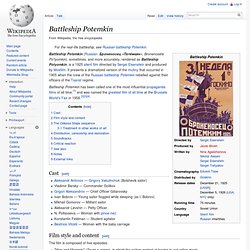
It presents a dramatized version of the mutiny that occurred in 1905 when the crew of the Russian battleship Potemkin rebelled against their officers of the Tsarist regime. Battleship Potemkin has been called one of the most influential propaganda films of all time,[1] and was named the greatest film of all time at the Brussels World's Fair in 1958.[2][3][4] Cast[edit] Film style and content[edit] The film is composed of five episodes: Eisenstein's experiment was a mixed success; he "was disappointed when Potemkin failed to attract masses of viewers",[8] but the film was also released in a number of international venues, where audiences responded positively.
Bronenosets Potyomkin (Battleship Potemkin) (1925) - Full Movie. Andrei Tarkovsky. Andrei Rublev (film) Andrei Rublev (Russian: Андрей Рублёв, Andrey Rublyov), also known as The Passion According to Andrei (Russian: Страсти по Андрею), is a 1966 Soviet biographical historical drama film directed by Andrei Tarkovsky and co-written with Andrei Konchalovsky.
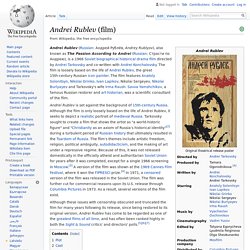
The film is loosely based on the life of Andrei Rublev, the great 15th-century Russian icon painter. The film features Anatoly Solonitsyn, Nikolai Grinko, Ivan Lapikov, Nikolai Sergeyev, Nikolai Burlyayev and Tarkovsky's wife Irma Raush. Savva Yamshchikov, a famous Russian restorer and art historian, was a scientific consultant of the film. Note: The following synopsis refers to the original, 205 minute version of the film. Andrei Rublev is divided into eight chapters, with a prologue and an epilogue only loosely related to the main film. The film's prologue shows the preparations for a hot air balloon ride. Fresco Bosom of Abraham by the historical Daniil Chyorny (c. 1360–1430) I. II. III. IV. V. VI. VII. VIII. Middle Ages in film Notes. Андрей Рублев 1 серия / Andrei Rublev film 1.
Ivan's Childhood. The film tells the story of orphan boy Ivan and his experiences during World War II.
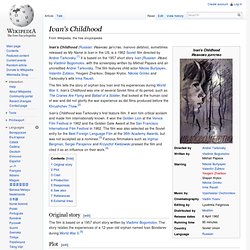
Ivan's Childhood was one of several Soviet films of its period, such as The Cranes Are Flying and Ballad of a Soldier, that looked at the human cost of war and did not glorify the war experience as did films produced before the Khrushchev Thaw.[2] Ivan's Childhood was Tarkovsky's first feature film. It won him critical acclaim and made him internationally known. Иваново детство / Ivan's Childhood.
Solaris (1972 film) Psychologist Kris Kelvin (Donatas Banionis) is being sent on an interstellar journey to evaluate whether a decades-old space station should continue to study the oceanic planet Solaris.
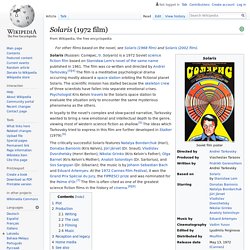
He spends his last day on Earth with his elderly father (Nikolai Grinko) and retired pilot Berton (Vladislav Dvorzhetsky). Years earlier, Berton had been part of an exploratory team at Solaris but was recalled when he described seeing a four-meter-tall child on the surface of the water. This was dismissed as a hallucination by a panel of scientists, but now that the remaining crew members are making similarly strange reports, Kris's skills are needed. After a fitful sleep, Kelvin is shocked to find Hari (Natalya Bondarchuk), his late wife, in his sleeping quarters. She is unaware of how she got there. That evening, Hari reappears in his quarters. In time, Hari becomes independent and is able to exist away from Kelvin's presence.
Kelvin becomes ill and goes to sleep. Solaris 1972.